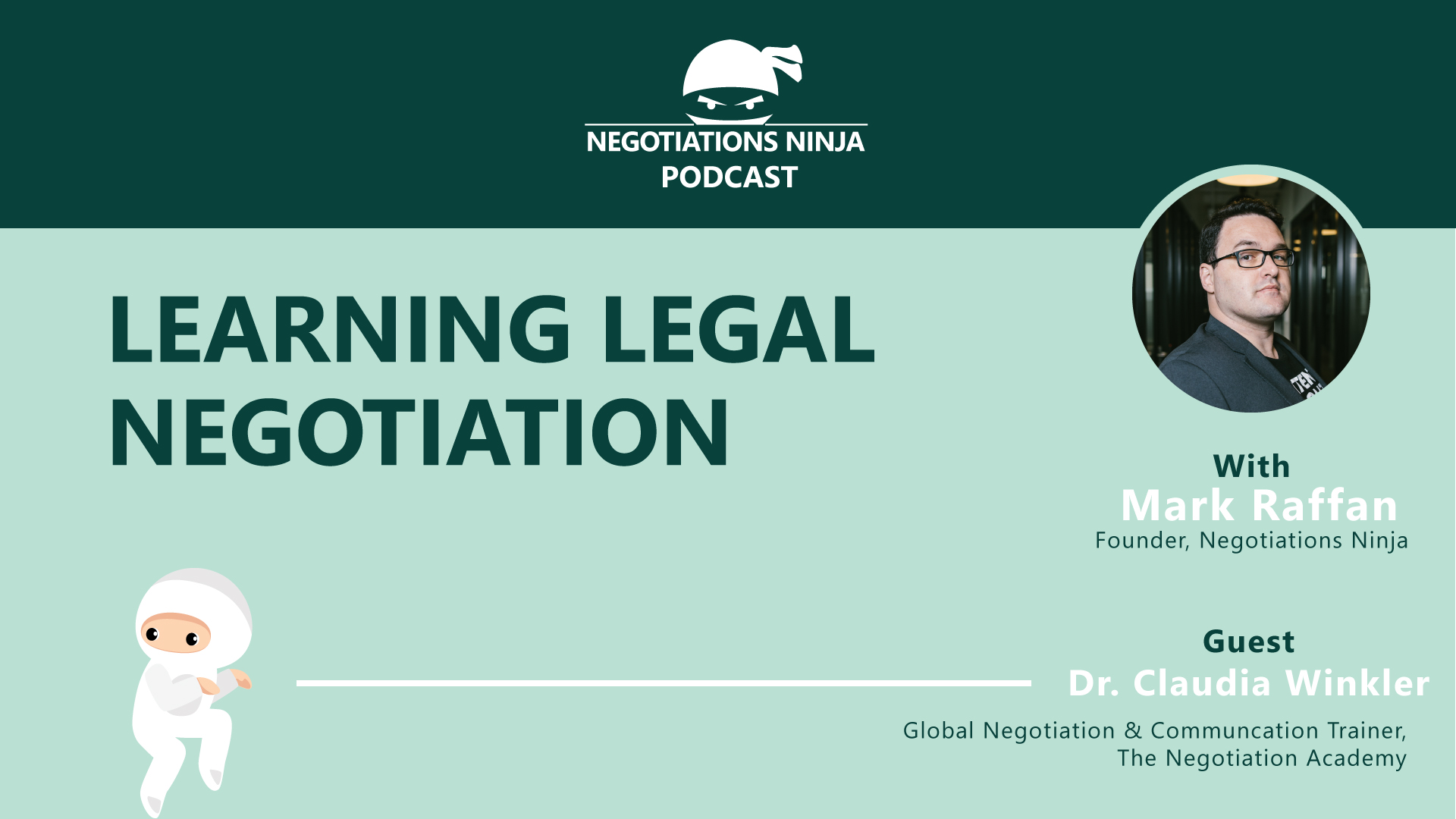Most lawyers are not properly trained in legal negotiations. In many law schools, negotiation classes are offered—but not mandatory. So how does a lawyer cultivate the necessary skills and learn to negotiate effectively? Dr. Claudia Winkler joins me today to open the discussion about legal negotiation. We talk about the perception of lawyers’ abilities, managing emotion, planning a legal negotiation—and more. Don’t miss this episode of Negotiations Ninja!
Dr. Claudia Winkler is the founder and lead trainer at The Negotiation Academy™. She holds a Master of Law from Harvard Law and a Doctorate of Law (in European Union Law) from Johannes Kepler Universität Linz. She desires to help lawyers leverage their communication and negotiation skills to become the super-negotiators of tomorrow. Listen for a glimpse of her story and an overview of negotiations for lawyers.
Outline of This Episode
- [2:08] Dr. Claudia Winkler’s background in law and negotiation
- [3:58] The public expectation that lawyers are super-negotiators
- [8:10] Where legal negotiations tend to derail
- [9:53] Fight or flight: how to teach lawyers to manage their emotions
- [11:49] How Claudia recommends improving negotiation skills
- [14:44] Planning and preparation for a legal negotiation
- [16:40] Cultivate open communication between lawyers and clients
- [20:17] Negotiating during times of crisis
- [23:41] Enactment of a Force Majeure clause
- [26:52] How to connect with Dr. Claudia Winkler
The common misconception of lawyers
Claudia points out that the general public expects lawyers to be super-negotiators: “There’s a problematic divide in the perception of the general population, that every lawyer by definition must be an excellent negotiator.” The sad reality is that most lawyers don’t get the necessary training to be skilled negotiators.
Clients will hire lawyers to manage their business negotiations, only to find that the negotiation process is failing. In many instances, the lawyer is hindering the process—destroying value instead of building it. Whereas the general population used to revere lawyer’s skills, now they are biased against lawyers. Claudia’s goal is to help lawyers—and other negotiation professionals—develop those oh-so-necessary skills that they’re lacking.
Planning and preparation for legal negotiations
Preparation for a legal negotiation is similar to any other negotiation. Of course it depends on each legal situation. But building from there, you have to look at the interests behind positions, gauge bargaining power, and research objective criteria. Claudia states that “What is especially key and what’s often overlooked is looking more broadly at business interests.”
Problems arise because many lawyers stop probing for what makes each case unique and different. Instead, they only focus on how a case is similar to previous cases. But what sets your client apart? How is their situation unique? What is really important to them? What long-term effects do they want to have?
When you focus on those key drivers you can negotiate a good deal. Claudia believes it’s a mindset that you must learn to develop and remember to stress in the negotiation process.
Clear and open communication is key
Claudia notes that a lawyer can’t leave a failed negotiation and say: “Well the client didn’t tell me this was key.” Guess what—it was your job to find out what was important. As a lawyer, you need to understand the motivations underneath the legal problem. You must learn to actively listen to your clients to gauge the direction you must take.
Likewise, clients can’t assume that what’s obvious to them is obvious to their lawyer. You must overly communicate your big-picture business interests. It helps guide them on how to act and determine what their role is moving forward. Claudia notes that you must tell your lawyer how to communicate with you. Don’t you want to be involved in every step of the process? Or do you want to be notified when all is said and done?
You cannot rely on your communication preference. Learning your client’s preference on the front end leads to better communication—and happier clients.
Legal negotiations in times of crisis
At the time of recording this podcast, the world is struggling amidst the Coronavirus Crisis. The global impact on large and small businesses continues to grow. It’s an unprecedented and challenging time because we have very little to compare to. There aren’t clauses in contracts to account for situations like this.
If you’re forced to negotiate a business contract, you’ll need to rely on being creative to find solutions that benefit both sides. There are certainly psychological hurdles that must be overcome. Everyone is focused on loss-aversion because every business feels that they’re in a lose-lose scenario.
When you become focused on loss-aversion it becomes far harder to focus on solutions. So don’t allow yourself to fall into the trap—think outside the box and create new opportunities to benefit your clients and their counterpart.
To learn why negotiations derail, how to overcome emotions and psychological hurdles, and whether or not to consider a ‘Force Majeure’ clause in contracts moving forward—listen to the whole episode of the Negotiations Ninja podcast!
Resources & People Mentioned
Connect with Claudia Winkler
- The Negotiation Academy
- The Negotiation Academy Facebook
- Claudia’s Personal Website
- Connect on LinkedIn
Connect With Mark
- Follow Negotiations Ninja on Twitter: @NegotiationPod
- Connect with Mark on LinkedIn
- Follow Negotiations Ninja on LinkedIn
- Connect on Instagram: @NegotiationPod
- negotiations.ninja




